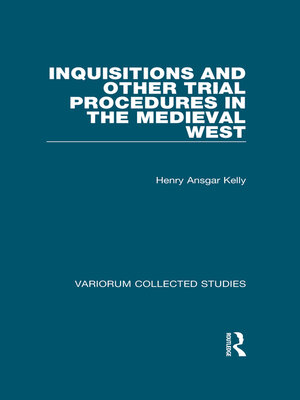Inquisitions and Other Trial Procedures in the Medieval West
ebook ∣ Variorum Collected Studies
By H.A. Kelly

Sign up to save your library
With an OverDrive account, you can save your favorite libraries for at-a-glance information about availability. Find out more about OverDrive accounts.
Find this title in Libby, the library reading app by OverDrive.



Search for a digital library with this title
Title found at these libraries:
| Library Name | Distance |
|---|---|
| Loading... |
'Inquisition' was the new form of criminal procedure that was developed by the lawyer-pope Innocent III and given definitive form at the Fourth Lateran Council of 1215. It has since developed a notoriety which has obscured the reality of the procedure, and it is this that Professor Kelly is first concerned with here. In contrast to the old Roman system of relying on a volunteer accuser-prosecutor, who would be punished in case of acquittal, the inquisitorial judge himself served as investigator, accuser, prosecutor, and final judge. A probable-cause requirement and other safeguards were put in place to protect the rights of the defendant, but as time went on some of these defences were modified, abused, or ignored, most notoriously among papally appointed heresy-inquisitors; but in all cases appeal and redress were at least theoretically possible. Unlike continental practice, in England inquisitorial procedure was mainly limited to the local church courts, while on the secular side native procedures developed, most notably a system of multiple investigators/accusers/judges, known collectively as the jury. Private accusers, however, were still to be seen, illustrated here in the final pair of studies on 'appeals' of sexual rape.







